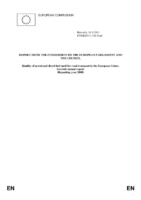| dc.description.abstract | Directive 98/70/EC1 sets minimum specifications on health and environmental grounds for fuels to be used for vehicles equipped with positive-ignition and compression-ignition engines. Fuel quality is environmentally important because it affects engine pollutant emissions and thus air quality. It also affects the ease and cost with which desired pollutant and greenhouse emission limits can be achieved by manufacturers. Directive 2003/17/EC2, amending Directive 98/70/EC, requires a further reduction of the sulphur content of petrol and diesel fuels. 2008 is the last year during which fuels with a sulphur content in excess of 10ppm will comply with the Directive. Non-respect of the fuel specification can lead to increased emissions (for example excess oxygenates can increase NOx emissions) and might damage engine and exhaust after-treatment systems (for example excess sulphur damaging catalysts) leading to higher air pollutant emissions. In order to ensure compliance with the fuel quality standards mandatory under this Directive, Member States are required to introduce fuel quality monitoring systems. Article 8 of Directive 98/70/EC requires the Commission to publish annually, a report on fuel quality in the Member States. This seventh Commission Report summarises Member States’ submissions on the quality of petrol and diesel, as well as the volumes sold, for the year 2008. All Member States except Luxembourg, which had already failed to deliver a report in 2007, submitted national reports for 2008. The quality of Member State’s monitoring system design, level of compliance with limit values, and information provided in report submissions is still improving. The Commission will continue monitoring compliance with the requirements laid down in the Directive and propose appropriate and proportionate action where necessary. As noted in 2006 and 2007, although sulphur-free fuels3 are accounting for an increasing proportion of fuel grades and sales across Member States, they are still not always labelled at the pump. There are still problems in timely delivery of reports. 14 Member States submitted their reports after the deadline, although 10 of these submitted their reports less than 1 month late. Submissions were received 7 months late from Malta; 5 months late from Germany; 4 months late from the UK; and 3 months late from Spain. As in 2007, Luxembourg did not submit a report in 2008. |

